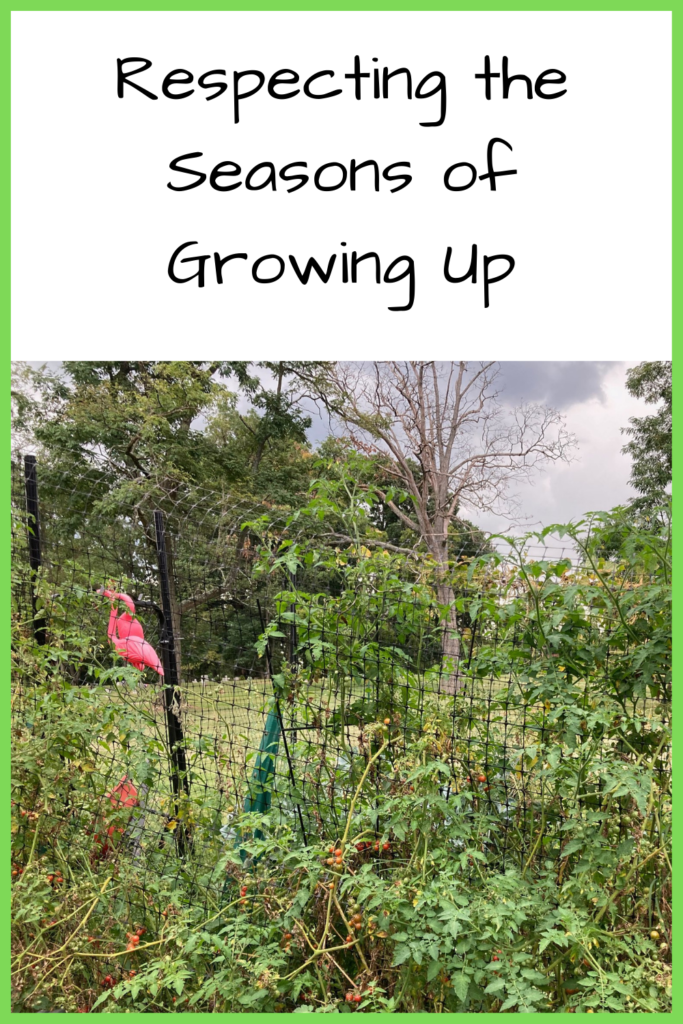
Breaking off twigs heavy with red cherry tomatoes, my mouth twisted in dissatisfaction with the brown leaves around it. I should have watered it better, I should have cleared the yellowed leaves out more, I should have, I should have, I should have.
But no, I thought, pushing that criticism aside. I was deriding myself for not fighting the plant’s natural cycle. Trying to keep cherry tomatoes neat and pruned is a fool’s errand. It works against rather than with the plant. We’re still getting loads of tomatoes – so what if it’s messy?
So often we try to buck the natural cycle of things even when they fulfill their purpose, don’t we? So often we try to make things neat and fast when they are messy and take time – like childhood.
On one hand, we’re rushing kids along and trying to fit them in little, pre-made societal boxes. I was recently listening to an episode of the 1000 Hours Outside podcast, where they were discussing that children are increasingly missing “middle childhood.” Our society is compressing and reducing the period between young childhood (pre-K) and adolescence. Schools are pushing academics earlier and earlier, sacrificing recess and other free play time as a result. People are considering what colleges their kids will get into in elementary school rather than fostering a love of learning. Sports and other activities take up way more time than when we were kids, making it hard to explore a variety of activities or just chill. While kids watch fewer commercials on TV, they’re constantly pushed materialistic messages by media, from YouTubers unboxing toys for young kids to Instagram influencers for older ones.
At the same time, we’re restricting our kids’ independence more and more at older and older ages. This is in part because of the whole “way too many activities” issue. Not having free time makes it hard to hang out at the park with your friends or be home by yourself. But it seems like a lot of parents simply don’t trust their kids to be without adult supervision. Our neighborhood actually has a decent number of kids roaming around, but that’s unusual compared to most places. Of course, even if you do trust your kid to be alone doesn’t mean that other people do too – parents have been investigated by CPS for allowing kids to walk home or play at the park at ages that would have been totally normal 30 years ago. (And if you are poor and/or not white, the chances of that happening are even higher.) As a result, kids are going from almost never being alone to being allowed to have a drivers’ license at 16. Without scaffolding, that big increase in freedom is way too much of a jump.
Neither of these attitudes or approaches follow the natural process of growing up. By rushing and attempting to hold back the process at the same time, we’re shoving our kids in these societal molds. As a result, we’re stressing them and us out simultaneously.
Just like growing tomatoes, growing up is messy. It’s just an inherent part of the process. There’s pain, there’s sorrow, there’s scratched arms, there’s rotten stuff. But there’s also dripping fresh vegetables and green leaves and the joy of knowing that you’ve accomplished something. And if you try to control any of it too much, everyone ends up exhausted and frustrated.
This doesn’t mean that you never prune the tomatoes or don’t give your kids boundaries or guidance. (Anyone who has grown cherry tomatoes know that they’ll just take over the whole garden without some maintenance.)
But like with tomatoes, we have to give our kids a good environment and space to grow. We have to not force them into producing things out of season – or before they’re not ready for it, whether “it” is reading full sentences in kindergarten or going to soccer practice 5 days a week. We have to give them the free time and independence to stretch out, to expand. And sometimes, if we let them, they’ll surprise both us and themselves with what they do.